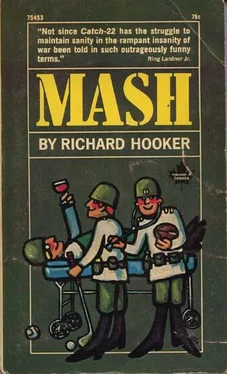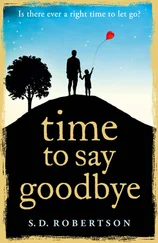By midafternoon it had started to snow again. The Duke, between complaints about the Yankee weather, was writing his wife, and Hawkeye was reading The Maine Coast Fisherman when Mclntyre got up from his cot and headed for the door.
“Where you goin’?” asked Hawk.
“To the Winter Carnival.”
With that he headed out of the tent in the general direction of the mountain to the west. Half an hour later he was seen halfway up it.
“That,” said Duke Forrest, “is the strangest son-of-a-bitch I ever did see. If he wasn’t the best chest-cutter in the Far East Command, I’d kick his ass out of this here tent.”
“Just wait,” Hawkeye said.
Martini time came. Duke and Hawkeye were having their first, Hawkeye deep in thought.
“I know I’ve seen that guy before,” he said finally, “and before long I’m going to remember where. I figure he went to Dartmouth, with all this Winter Carnival crap. Also Daniel Webster said, ’It’s a small place,’ and so forth. Which reminds me, did I ever tell you how I beat Dartmouth single-handed?”
“Yeah, but only sixteen times. Tell me again.”
“Well, it was just a midseason breather for the Big Green, but a blizzard blew up and it was 0-0 going into the last minute. They had this boy who was supposed to be a great passer so he threw one, snow and all, and—”
Just then the door opened, and in came Mclntyre covered with snow.
“Where’s the martinis?” he asked.
Hawkeye looked at him, and suddenly the intervening years and the nine thousand miles dissolved and memory functioned. Perhaps it was the snow or the thought of Dartmouth or both. He jumped up.
“Jesus to Jesus and eight hands around, Duke!” he yelled. “You know who we been living with for the past week? We been living with the only man in history who ever took a piece in the ladies’ can of a Boston & Maine train. When the conductor caught him in there with his Winter Carnival date she screamed, ’He trapped me!’ and that’s how he got his name. This is the famous Trapper John. God, Trapper, I speak for the Duke as well as myself when I say it’s an honor to have you with us. Have a martini, Trapper.”
“Thanks, Hawkeye. I wondered when you’d recognize me. The minute I saw you I knew you were the guy that intercepted that pass. Lucky you didn’t have your mouth open or it would have gone down your throat.”
“Trapper, Trapper, Trapper,” Hawkeye kept saying, and shaking his head. “Say, what you been doing since then?”
“Not much. Just living on my reputation.”
The Duke got up and shook hands with Trapper.
“Right proud to know y’all, Trapper,” he said. “Are you sure y’all don’t have the clap? Y’all look right peaked.”
“I got over the clap. I’m so skinny because I don’t eat.”
“Why not?”
“Got out of the habit.”
“Don’t let it worry you,” Hawkeye said.
“It could happen to anybody,” Duke said.
And so the Trapper was one of them. An hour later the three tentmates weaved into the mess hall, arm in arm.
“Gentlemen,” yelled Hawkeye, “this here is Trapper John, the pride of Winchester, Dartmouth College, and Tent Number Six, and if any of you uneducated bastards don’t like it you’ll have to answer to Duke Forrest and Hawkeye Pierce.”
For several weeks following the identification of Captain John Mclntyre as Trapper John things settled down into an orderly routine. The work during the twelve-hour shifts was often intense, sometimes lacking, and usually somewhere in between.
Although many of the casualties were brought in from the Battalion Aid Stations by ambulance and might arrive at any hour, the most seriously wounded were flown in by helicopter. This meant that daylight was the frequent arrival time because the choppers did not fly at night. When the night shift had worked steadily from 9:00 p.m. to 4:00 a.m. and finally had everything cleaned up, some of its members could usually be seen as the first light of day seeped into the wide valley, peering north beyond the mine field and the river with its railroad bridge, hoping against hope that no choppers would materialize out of the mist.
When casualties were heavy, the regular schedule was ignored and every man worked as long as he could stay on his feet, think and still function. Finally, overcome by fatigue, he would grab a few hours of sleep and then go back to it again. When things were under control, however, there was leisure time and, particularly in winter and early spring, very little to do with it.
Tent Number Six, the home of Forrest, Pierce and Mclntyre, became a center of social activity. It also became known as The Swamp, partly because it looked like the kind of haunt one might come across in a bog and partly because Hawkeye Pierce, while in college and unable to afford a dormitory room, had lived just off the campus in a shanty that his classmates had called The Swamp. The words, in big capital letters—THE SWAMP—were painted in red on the door of Number Six.
Cocktail hour at The Swamp began at 4:00 p.m., the hour at which the night shift normally awakened and had a few before supper, and the hour at which the day shift, if unemployed, could begin to relax. Cocktails consisted of better booze than most of the crew had ever had at home, and martinis were a favorite, served in water glasses filled to the brim.
A frequent visitor to The Swamp parties was the Catholic chaplain of the area, Father John Patrick Mulcahy, a native of San Diego and former Maryknoll missionary. He was lean, hungry-looking, hook-nosed, red-haired, and, in the eyes of the Swampmen, one of a kind.
The occupants of The Swamp had loose religious affiliations. Hawkeye claimed he had been brought up to be an all-over Baptist but that he had lost his nerve at the last minute. Duke was a foot-washing Baptist, and Trapper John was a former mackerel-snapper who had turned in his knee pads. It was the Duke who hung the name of Dago Red on the Father, and the Father accepted it with good humor.
Prior to being in the Army, Dago Red had spent five years in China and seven years on the top of a mountain in Bolivia. His contacts had been limited. With Duke and Hawkeye and Trapper John he found stimulation in conversation that included politics, surgery, sin, baseball, literature and religion. Dago Red combined the dignity of his profession and the wisdom, understanding and compassion of an honest missionary with the ability to tolerate the Swampmen. He became one of them.
At two o’clock one morning, Hawkeye and Trapper John were fighting what seemed to be a losing battle in the OR with a kid who had been shot through both chest and belly. Despite control of hemorrhage and administration of blood, the patient, whose peritoneum had been contaminated for ten hours by spillage from his lacerated colon, went deeper and deeper into shock.
“Maybe we’d better get Dago Red,” said Hawkeye.
“Call Dago,” ordered Trapper John.
A corpsman went for him. Within minutes he appeared.
“What can I do for you fellows?” asked the Father.
“Put in a fix,” said Hawkeye. “This kid looks like a loser.”
Father Mulcahy administered the last rites. Shortly thereafter, the patient’s blood pressure rose from nowhere to 100, his pulse slowed to 90, and he went on to recover.
From then on Dago Red put in many a fix. With the Swampmen it was mostly a gag, but one they could not quite bring themselves to forgo when things were rough. As far as Red was concerned, of course, it was no joke. He spent many sleepless nights applying fixes and feeding beer, whiskey, coffee or consolation to distraught surgeons whose patients had not responded to the fix or who were waiting for the fix to take.
Читать дальше












